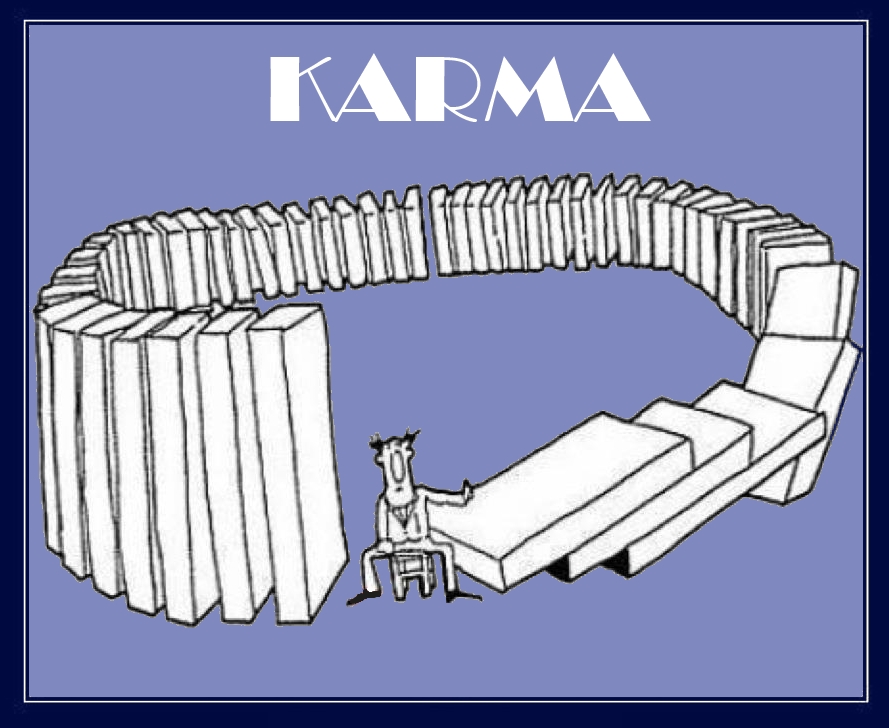This is the 4th part of Jnanappana series. Please read the Part 1 , Part 2 and Part 3 if you have not yet…
കർമ്മം [Karma]
ഒന്നുകൊണ്ടു ചമച്ചൊരു വിശ്വത്തില്
മൂന്നായിട്ടുള്ള കര്മ്മങ്ങളൊക്കെയും
[Onnu kondu chamachoru viswathil,
Moonayitulla karmangal okkeyum]
This world which is made by one veil of ignorance
has three differing types of karmas (actions)
പുണ്യകര്മ്മങ്ങള് പാപകര്മ്മങ്ങളും
പുണ്യപാപങ്ങള് മിശ്രമാംകര്മ്മവും
[Punya karmangal papa karmangalum,
Punya papangal misramam karmavum]
Good deeds / divine actions, sinful actions
and a mix of both
മൂന്നുജാതി നിരൂപിച്ചു കാണുമ്പോള്
മൂന്നു കൊണ്ടും തളയ്ക്കുന്നു ജീവനെ.
[Moonu jathi nirupichu kanumbol,
Moonu kondum thalakkunnu jeevane.]
However, if we think deeper,
all these three karmas ties our soul to this world
പൊന്നിന് ചങ്ങലയൊന്നിപ്പറഞ്ഞതി
ലൊന്നിരുമ്പുകൊണ്ടെന്നത്രെ ഭേദങ്ങള്.
[Ponnin changala onnee paranjadhil,
Onnil irumbu kondathre bedangal]
Chain of gold, we think we are tied,
But it is no different from an iron chain.
രണ്ടിനാലുമെടുത്തു പണിചെയ്ത
ചങ്ങലയല്ലോ മിശ്രമാം കര്മ്മവും.
[Randinalumeduthu pani cheytha,
Changala yallo mishramum karmavum.]
And this chain of karma which ties our soul to this world
is no different but a mixture of these two
ബ്രഹ്മവാദിയായ് ഈച്ചയെറുമ്പോളം
കര്മ്മബദ്ധന്മാരെന്നതറിഞ്ഞാലും
[Brahma vadiyayi chayirumbolum,
Karmabadhanmar ennatharinjalum]
Even if we take the path of eternal truth,
Do not forget that, we are tied by our karmas
ഭുവനങ്ങളെ സൃഷ്ട്ടിക്കയെന്നതു
ഭുവനാന്ത്യപ്രളയം കഴിവോളം
കര്മ്മപാശത്തെ ലംഘിക്കയെന്നതു
ബ്രഹ്മാവിന്നുമെളുതല്ല നിര്ണ്ണയം
ദിക്പാലന്മാരുമവണ്ണമോരോരോ
ദിക്കുതോറും തളച്ചു കിടക്കുന്നു.
[Bhuvanangale srishtikka ennathu,
Bhuvananda pralayam kazhivolam,
Karma pasathe langikkunnathu,
Brahmavinnum eluthalla nirnayam,
Dik palakan marum avvannam orororo,
Dikku thorum thalachu kidakkunnu.]
The world would continued to be made,
till the end comes by a deluge,
And to go against the ties of these Karma,
definitely not easy even for Lord Brahma,
And even those eight divine forces who guard the directions
are strongly chained in their own places.
അല്പകര്മ്മികളാകിയ നാമെല്ലാം
അല്പകാലംകൊണ്ടോരോരോ ജന്തുക്കള്
ഗര്ഭപാത്രത്തില് പൂക്കും പുറപ്പെട്ടും
കര്മ്മംകൊണ്ടു കളിക്കുന്നതിങ്ങനെ.
[Alpa karmikalaya namellam,
Alpa kalam kondu ororo janthukkal,
Garbha pathrathil pukkum purapettum,
Karmam kondu kalikkunathengine.]
Those of us who has done little Karma,
in a small span of time,
enter and leaves the wombs of different animals,
and thus play with the Karma we have earned.
Comments:
Bhakta Kavi (kavi = poet) Poonthanam goes on to describe different Karmas and how it affects our life. He says, there are three types of karmas (actions), namely, the good or the divine actions, the sinful actions and a mixture of both good and bad actions. It does not matter whatever our actions are, be it good or bad or a mixture of both, our soul is chained to this world based on these karmas.
He says, we are tied to our karmas because of our lack of understanding that all our actions and this whole world are maya – an illusion. In the previous post, we saw how one can be free from our Karma Phalams (the result of the Karmas) – that is by performing every actions without being attached to the fruits of the action, but merely for the sake of performing our duty, as an offering to the Supreme.
We can’t escape our karmas by inaction or renunciation of actions – by doing nothing we can escape karma is a myth. If we perform our duties with our mind fixated on the fruits of those actions, with an egoistic assumption of doership, then we must also bear all its consequences – be it good or bad or a mixture of both. In order to have real freedom – the freedom from the subjugation of mortal life and confinement to this world of illusion and ignorance – one must perform his duties for the sake of doing it, and not worry about the success or failure that the action may bring.
The poet says, if you think deeper about all these three actions – the good, the bad and the mixture of both – is it not same like being chained by a golden chain or an iron chain? What difference does it make, either golden chain or an iron chain, a person who is chained is after all is chained! There is a proverb in Malayalam: “Bandhura kaanchana koottilaanenkilum, bhandhanam bhandhanam thanne paaril” – literally translated, it means that, “a cage is a cage even if it is made of gold”. Similarly, the bondage created by good or bad karmas or the mixture of both is still a bondage which confines us to this illusory world.
The poet is telling us not to be enchanted or disillusioned by the rewards, recognitions or the punishments, etc. that we may receive in our life. They are all mere illusions.
The poet then goes on to stress how difficult it is to break away from that bondage of our karmas. He says, it is not easy even for Lord Brahma! Similarly, even the eight gods who guards eight directions / eight zones of the universe, are bound to their own directions. (avvannam means, the guardians of the directions, Dikpāla, which is often augmented with two more – Zenith and Nadir – and they are: Kubera, Yama, Indra, Varuna, Ishana (Shiva), Agni, Vaayu, Rakshasa, Bhrahma and Vishnu).
He continues to say, even those who have done little karmas in their life, goes from womb to wombs of animals (the cycle of life and death) forever. This is how karma is playing us out.
In all these lines, Poonthanam hints about being detached from our karma and performing our actions for the sake of doing it. This answer by Ramana Maharshi on non-attachment is beautiful: “As thoughts arise, destroying them utterly without any residue in the very place of their origin is non-attachment. Just as the pearl-diver ties a stone to his waist, sinks to the bottom of the sea and there takes the pearls, so each one of us should be endowed with non-attachment, dive within oneself and obtain the Self-Pearl.”
We will see what happens to our life according to Jnanappana in the next part.

